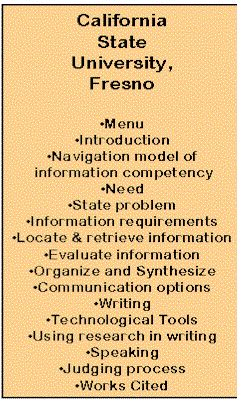
Writing and Information
Competency in Small Bytes
by John A. Cagle and Ross LaBaugh

Evaluate information
As you get information from your various sources, critical judgment is needed to understand the value of each piece of information. Aristotle wrote 2300 years ago that an audience judges a speaker on three criteria: competence, trustworthiness, and good will. These criteria work pretty well for judging whether you should use information in a paper or a speech today. If you hold an article in your hand, ask yourself three questions: How competent is the author of this information? Can I trust the author to have been honest and thorough in giving me the information? What motives does the author have for writing this material in the form it is in?
If you read a lot of books on evaluating evidence, you'll find some common standards that echo these criteria:
Links to Previous Competency and to Next Competency
Link to Table of Contents
Communication and
Information Competency in Small Bytes
Menu Introduction
Need State problem Information requirements Locate & retrieve
information Evaluate information Organize
and Synthesize Communication options Writing Technological Tools Using research in writing Speaking Judging process Works Cited
ã 1998 by John A. Cagle, Professor of Communication, California State University, Fresno.
This information competency website was designed by John A. Cagle (Department of Communication) and Ross LaBaugh (Instructional Coordinator, Henry Madden Library) as part of a grant from the California State University. It continues to be under construction.